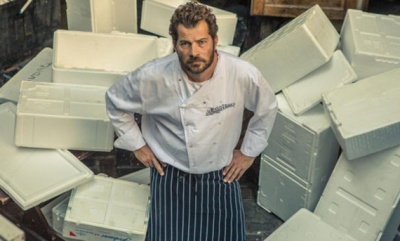Recycling Association calls out chefs’ campaign to ban polystyrene
The top London chefs who called for a ban on the use of polystyrene last week are wrong to suggest that the material is environmentally damaging, according to the Recycling Association, and restaurants could do more themselves to ensure its greater recycling.

But Simon Ellin, Chief Executive of trade body the Recycling Association has this week echoed the views of Foodservice Packaging Association (FPA) Executive Director Martin Kersh by questioning the chefs’ claims.
Commenting on the campaign he said: “Expanded polystyrene (EPS) is a valuable commodity, and contrary to the claims of the chefs, is 100 per cent recyclable.
“One of the reasons that this material is not always collected by waste management companies is that it is very light and bulky. This means that they cannot justify collecting this material alone, as a single stream. In addition, it is often contaminated by the fish that are packed in it, and so is less valuable than clean EPS.
“However, to say that it cannot be recycled is not true – and if organisations were to, quite literally, think outside of the EPS box, then there are solutions.
“We all know that London is packed full of restaurants, and it should not be impossible for these chefs to get together to make collection of this material worthwhile in such a densely-populated restaurant scene.”
Wary of alternatives
The chefs’ campaign kicked off last week with an open letter to Mayor of London Sadiq Khan. In it, Bains said that the ‘unsightly and environmentally damaging method of packaging’ that is ‘not biodegradable or recyclable’ was spilling out onto the streets as restaurants do not have the space to store them and have no way of recycling them.
He suggested that by using more environmentally-friendly materials, the thriving hospitality industry in central London could lead the way in boosting the capital’s recycling and reuse rate.
But Ellin has warned that more easily recycled materials may not result in an improvement: “We should be wary of looking at alternatives, as we know that the cardboard sector does not like contamination, and reinforced cardboard might end up being harder to recycle than the EPS.”
International Forest Products European Trade Director and Recycling Association board member Amie Stringer added: “It is always the same that quality is king when it comes to any recyclable material.
“But recycling of EPS is always possible if the supplier of the material cares enough to make it happen. For example, Billingsgate fish market in London has its own successful EPS recycling scheme [where EPS fish boxes are converted into a melted material suitable for products like park benches and decking].
“There is no reason why these boxes cannot be recycled by the chefs, as long as they get the right collection scheme in place, especially if these restaurants were prepared to pay a little bit more to get it collected.”
Full lifecycle must be looked at
Last week, FPA Executive Director Kersh encouraged the chefs to consider the full lifecycle of the packaging, and the role they play in keeping food safe and protecting the resources invested in growing and transporting them.
He said: “The chefs involved should have first discussed the management of used EPS fish boxes with their waste management contractors, rather than issue these very inaccurate comments. It’s a shame these superb chefs have focused their attentions on a single material which is 100 per cent safe, is resource efficient and has excellent functional benefits.
In 2013, two studies, funded by producers of fish boxes and carried out by Ecobilan and Cool Logistics, examined the environmental credentials of EPS fish boxes. The first tracked the journey of fish and shellfish for thousands of miles across three European markets, comparing the performance of three alternative fish box materials including polystyrene, waterproofed cardboard and corrugated polypropylene. The study showed that across these markets, in seven of the eight performance indicators, polystyrene was better than or at least comparable to the alternative materials.
This point reflects recommendations to the European Union made by a number of packaging associations this week stating that attempts to introduce more resource-efficient systems through the EU’s Circular Economy Package should not overlook the full lifecycle impacts of packaging.
Responding to the letter, Khan’s office said that the mayor had no power to enforce a ban, but that he is supportive of any initiatives that would help boost recycling in the capital. Khan announced earlier this month that he had appointed Shirley Rodrigues as Deputy Mayor for Environment and Energy to oversee plans for creating an ‘Energy for Londoners’ policy, aimed at increasing recycling rates and the production of low-carbon energy in the city. 









